In today’s fast-paced digital landscape, consumers expect more than just generic interactions—they demand real-time, context-aware experiences that feel tailor-made for them. While Generative AI, particularly Large Language Models (LLMs) like GPTs, has revolutionized content creation, it’s only one piece of the puzzle. True hyper-personalization requires a broader AI-driven strategy that integrates predictive analytics, real-time segmentation, and behavioral modeling. In this blog, we’ll explore how AI is transforming marketing personalization beyond GPTs and how Algonomy’s solutions such as Active Content and others are leading the charge.
The Evolution of AI in Marketing Personalization
The journey of AI in marketing personalization has been nothing short of transformative. We’ve moved from rule-based personalization, where static rules dictated customer interactions, to AI-powered personalization that surfaces machine learning-driven recommendations in real time. Generative AI has further accelerated this evolution by enabling scalable content creation. However, while GPTs excel at generating text, they often fall short in delivering truly personalized experiences.
- Lack of Contextual Relevance: GPTs generate content based on data patterns, but they often lack the ability to understand the specific context of a customer’s journey.
- Generic Output: The content produced by GPTs can feel impersonal and fail to resonate with individual customers.
- Inability to Adapt in Real-Time: GPTs are not designed to adjust content dynamically based on real-time customer behavior or preferences.
These limitations highlight the need for a more comprehensive approach to personalization solutions—one that goes beyond content generation and leverages predictive AI, real-time data, and multi-touchpoint engagement.

Why Generative AI Alone is Not Enough for Hyper-Personalization
While Generative AI has its place in the marketing toolkit, it’s not a silver bullet for hyper-personalization. Consumers today expect more than just automated content—they want interactions that are context-aware, predictive, and seamlessly integrated across channels.
Here are the key challenges with Generative AI:
- Manual Intervention Required: Marketers often need to manually tweak GPT-generated content to ensure it aligns with brand voice and customer context.
- Lack of Predictive Capabilities: Generative AI can’t anticipate customer needs—it can only react to them.
- Limited Integration: GPTs operate in isolation, making it difficult to integrate with other data sources like CRM, customer data platform, or recommendation engines.
To truly deliver hyper-personalized experiences, marketers need to move beyond Generative AI and embrace predictive AI models that can analyze historical data, anticipate customer behavior, and deliver real-time, personalized content.
Predictive AI: The Future of Hyper-Personalized Email Marketing
Predictive AI is the next frontier in marketing personalization. By analyzing historical data and identifying patterns, predictive AI models can anticipate customer needs and deliver personalized experiences at scale. These include personalized product recommendations, personalized email marketing, dynamic content personalization, and beyond. Only a few players in the market can operate at scale and have vast experience delivering AI-powered solutions. Algonomy’s products for retail enterprises have been pushing the envelope with AI-powered solutions even before “AI” was cool.
Product Recommendations: Algonomy’s RecommendTM solution uses advanced segmentation and machine learning to deliver personalized product recommendations that drive conversions. By analyzing customer behavior, purchase history, and preferences, Recommend ensures that every product suggestion feels tailor-made.
Dynamic Content Assembly: Algonomy’s Active Content enables real-time, data-driven content personalization across email, SMS, and digital channels. Active Content enables marketers to create dynamic, and visually stunning hyper-personalized content that resonates with individual customers by providing a platform to mash up data from CRM, CDP, and integrate it into a visual content block.
Real-Time Segmentation: Algonomy’s Audience Manager allows marketers to trigger email campaigns based on real-time behavioral data, ensuring that messages are always relevant.
AI-driven segmentation ensures that brands can target users based on:
- Abandoned cart behavior
- Browsing activity without purchase
- Affinity towards specific brands or price points
- Likelihood to engage or churn
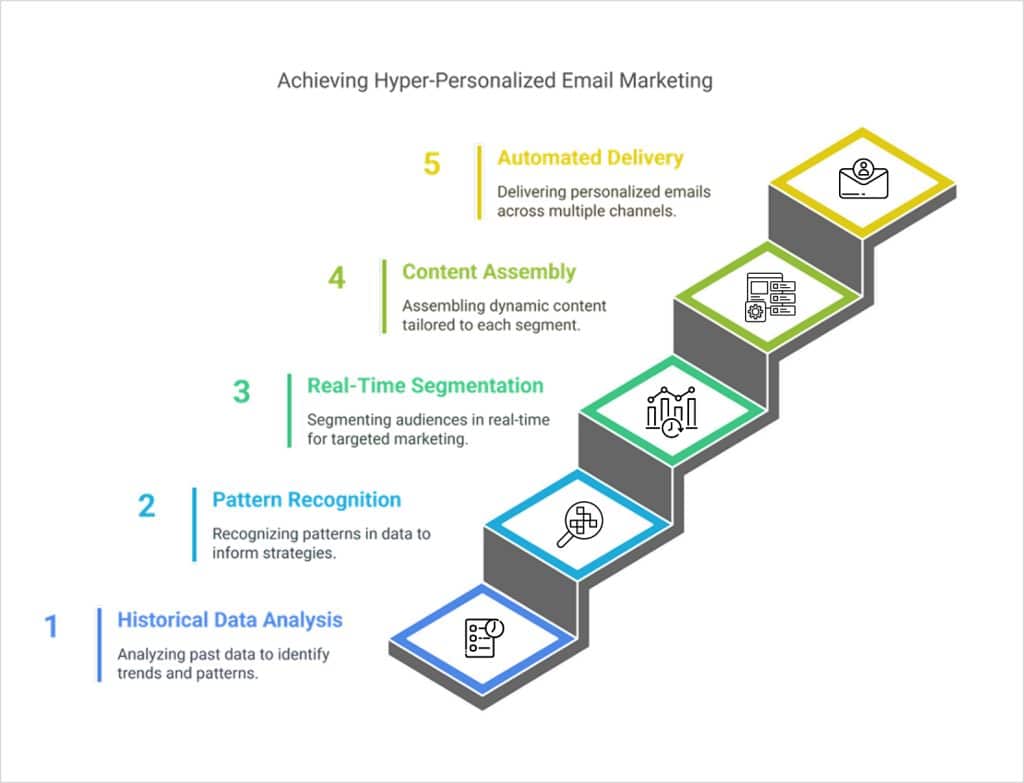
Real-World Examples of AI-Powered Personalization
Here are a few real-world use cases of predictive analytics in hyper-personalization:
Fashion & Apparel: AI stylists, such as Ensemble AI, curate outfits and product bundles based on individual preferences, co-occurrence data, and complementary colors. These recommendations are powered by predictive AI models that analyze customer behavior and preferences in real time.
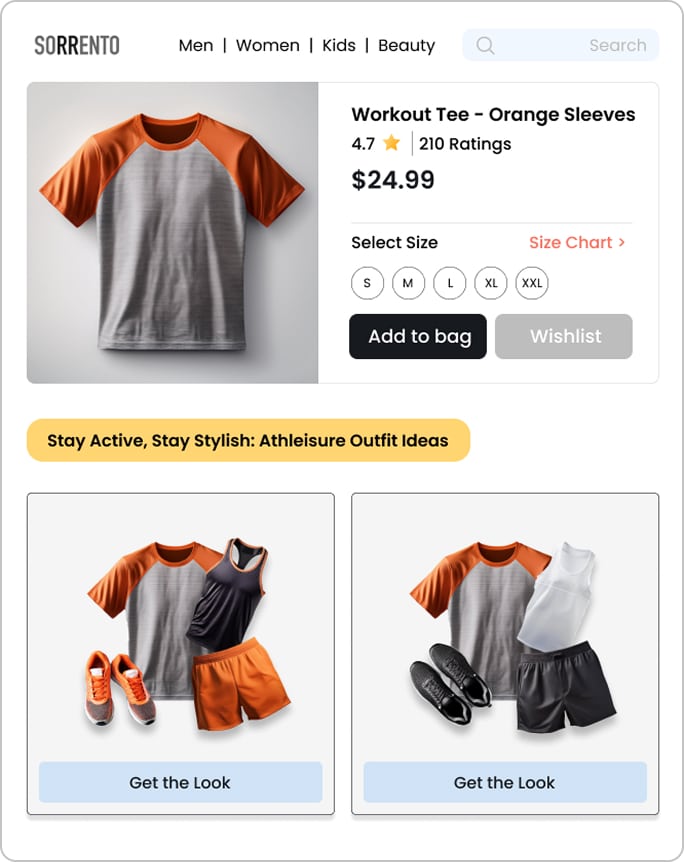
Grocery & CPG: AI-driven replenishment models suggest restocking essentials before customers run out. By analyzing purchase history and consumption patterns, these models ensure that customers never have to worry about running out of their favorite products.

E-commerce & Retail: AI optimizes social proof messaging, affinity-based campaigns, and personalized hero banners to drive conversions. For example, AI dynamically optimizes key metrics such as conversion rate, add-to-cart rate, and revenue per visit by automatically selecting what social proof message to display to the shopper in real time. In this manner, brands can deliver highly targeted campaigns that resonate with individual customers by leveraging predictive analytics.
Addressing Challenges: AI-Driven Content Must Be On-Brand & Privacy-Compliant
While AI-powered personalization offers immense potential, it also comes with challenges. Marketers must ensure that AI-generated content aligns with their brand voice and complies with data privacy regulations.
- Brand Consistency: AI-generated content can sometimes dilute brand voice. Algonomy’s Active Content ensures that all personalized messaging aligns with brand guidelines, maintaining consistency across channels such as website, mobile, and in-app.
- Privacy Compliance: AI-powered Personalization at scale requires access to customer data, which must be handled responsibly. Algonomy’s solutions are designed with privacy in mind, ensuring compliance with global data protection regulations such as GDPR, CCPA, and COPA.
- Ethical Personalization: AI should enhance customer experiences, not exploit them. Algonomy’s solutions prioritize consent-based marketing, ensuring that customers have control over how their data is used.
The Role of Algonomy’s Active Content in Hyper-Personalized Email Marketing
Active Content by Algonomy is designed to address the gaps in traditional email marketing by enabling marketers to effortlessly draw data from multiple sources to craft visually compelling creatives, delivered with open-time and send-time personalization.
- Real-Time Data Integration: Pulls data from CDPs, CRMs, recommendation engines, loyalty programs, and third-party APIs and allows marketers to mash them up and add to dynamic creatives blocks to create visually stunning content.
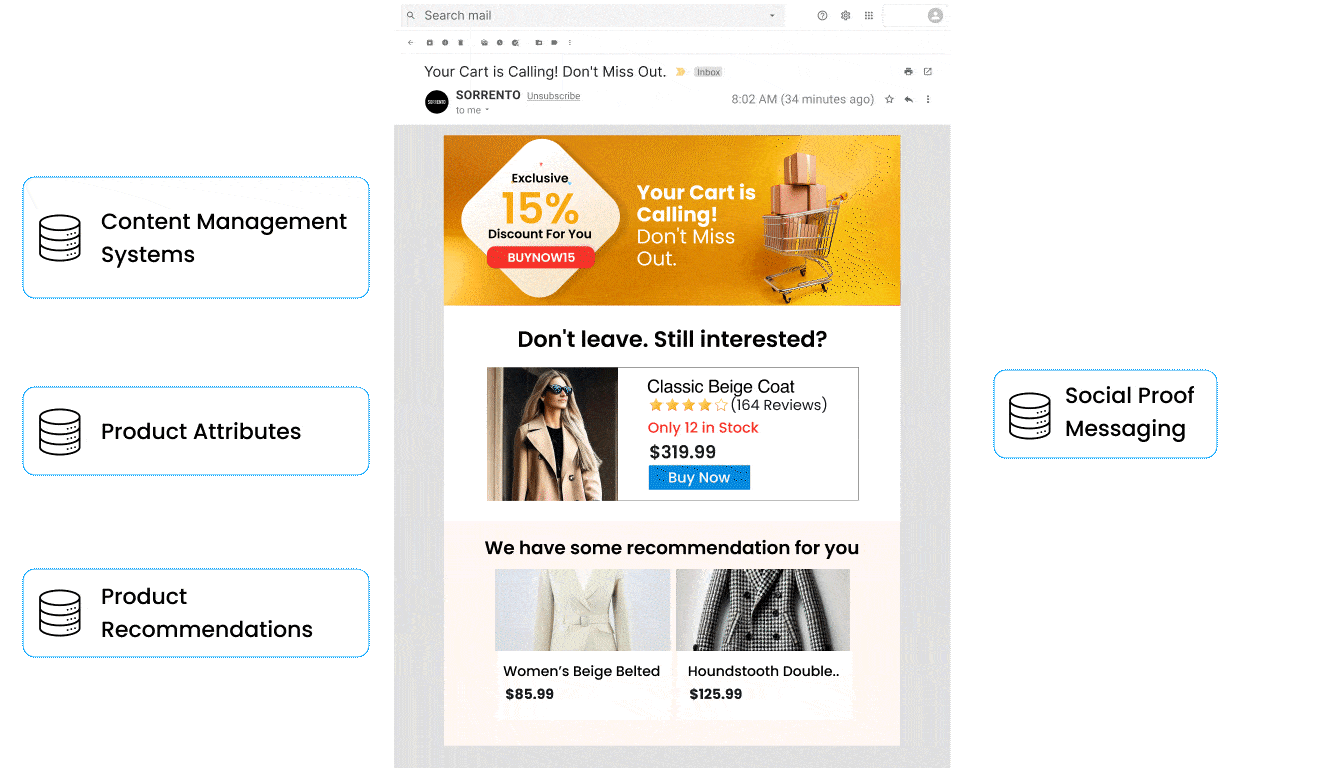
- Dynamic Content Personalization: This feature creates personalized email campaigns that change email content dynamically based on user behavior and retail variables such as price and inventory at the moment of engagement.

- Automates Omnichannel Delivery: Automates content delivery across the customer’s preferred media for interaction with the brand, be it email, RCS, SMS, or WhatsApp, ensuring relevance at every interaction.
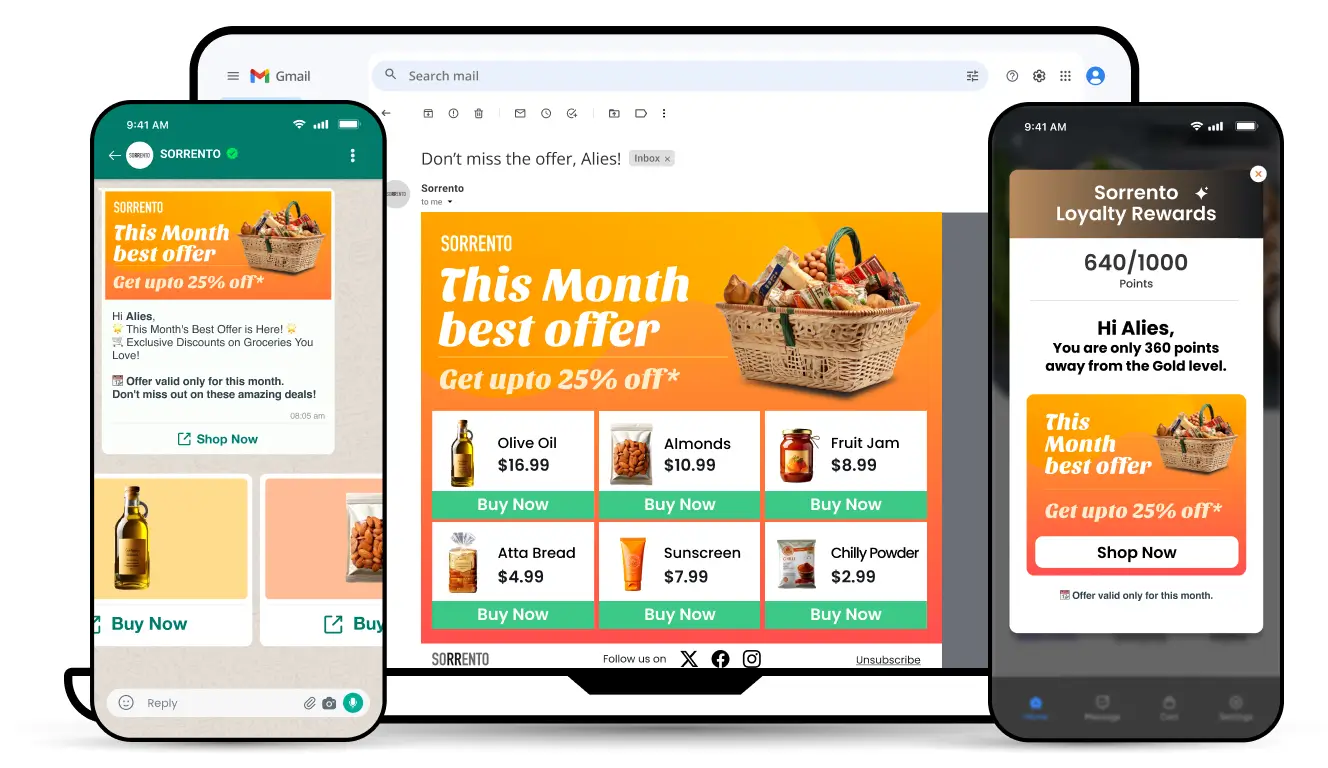
Unlock the Power of Hyper-Personalization with Algonomy
The future of marketing lies in hyper-personalization, and AI is the key to unlocking its full potential. While Generative AI has its place, true personalization requires a broader AI-driven strategy that integrates predictive analytics, real-time segmentation, and behavioral modeling.
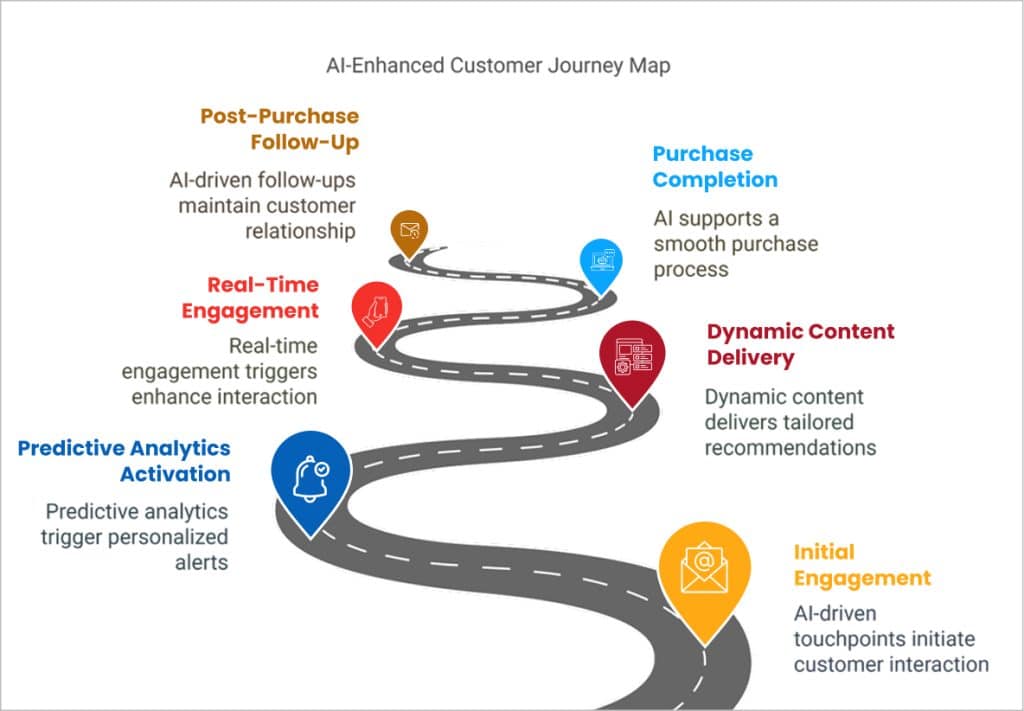
Ready to take your personalization efforts to the next level? Explore how Algonomy’s Active Content can help you deliver hyper-personalized experiences at scale. Sign up for a demo today and see how Algonomy can transform your marketing strategy.
Anuraag Verma
Anuraag is a seasoned content strategist and marketer, currently spearheading all-things-content in the realm of Digital Experience Personalization (DXP) at Algonomy. With a passion for writing, communications and marketing, Anuraag brings a unique blend of individual creativity and cross-functional collaboration to his work. Over 10 years, he has crafted compelling narratives that resonate with diverse audiences and drive business success for product companies. Once he takes off the work hat, you’ll find him staying active, catching up with friends (or a book) and sipping chai.
Diganta Roy
Diganta Roy is leading the Product Marketing charter at Algonomy, where he is at the forefront of innovation in Omnichannel Customer Marketing. With a rich background that spans e-commerce category marketing at Amazon and key roles in the Ad-Tech arena, Diganta brings a unique perspective to scaling global product companies from 0 to 1 and beyond.
At Algonomy, he spearheads the Product Marketing of state-of-the-art solutions like Active Content, empowering marketers worldwide with AI-powered tools to drive customer engagement. An MBA from MICA, he simplifies tech innovation with clear, customer-centric narratives, bridging the gap between technology and business.
 in Sweden from 7 - 8 October 2025. Pre-book a meeting to connect with our
product experts.
in Sweden from 7 - 8 October 2025. Pre-book a meeting to connect with our
product experts.










